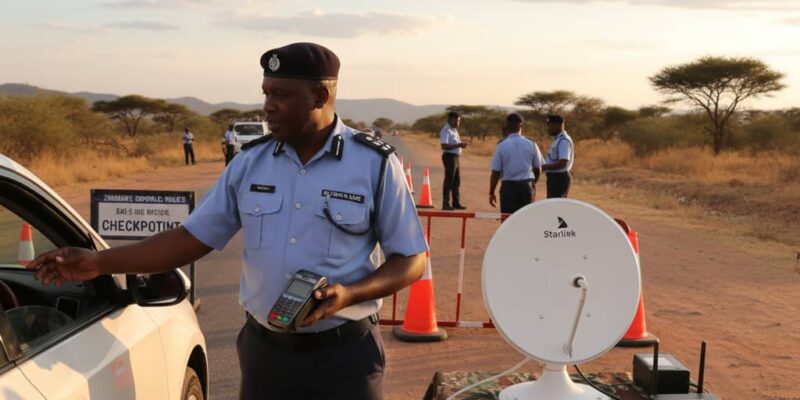GOVERNMENT is set to roll out Point-of-Sale machines at all police roadblocks countrywide in a move designed to enhance transparency, reduce corruption and improve convenience for motorists paying spot fines.
The initiative, spearheaded by the Ministry of Home Affairs and Cultural Heritage in collaboration with the Ministry of Information Communication Technology, Postal and Courier Services, marks a major step toward digitising law enforcement operations and aligning policing with Zimbabwe’s broader e-Government and cashless economy drive.
Debra Matabvu-Herald Reporter
By introducing POS machines, authorities seek to minimise cash handling by police officers, curb opportunities for corruption and ensure that payments are made directly into Government accounts in real time.
The system will also make it easier for motorists to make payments electronically, reducing delays and disputes at checkpoints.
Responding to questions in the National Assembly on Wednesday, ICT, Postal and Courier Services Minister Tatenda Mavetera said the Government would use Starlink’s satellite internet service to guarantee network connectivity for POS systems even in remote areas.
“It is important that there are Point-of-Sale machines whenever police are conducting roadblocks,” said Minister Mavetera.
“The Government, through collaboration between the Ministry of ICT and the Ministry of Home Affairs, is working to ensure that connectivity is available everywhere police operate. We are engaging Starlink to provide reliable internet access so that POS machines can function seamlessly across the country.”
The deployment of Starlink is a key enabler for this programme.
Unlike traditional mobile networks that depend on ground infrastructure, Starlink uses a constellation of low-orbit satellites, providing high-speed internet coverage even in rural and remote areas.
This ensures that roadblocks along less connected highways will have uninterrupted access for digital transactions.
Minister Mavetera added that the initiative formed part of Government’s broader ICT integration plan, which seeks to modernise service delivery and support the National Digital Transformation Strategy.
In an interview Home Affairs Permanent Secretary, Ambassador Raphael Faranisi, said the development would bring greater convenience for both motorists and police officers.
“It will obviously be convenient for those who have fallen foul of the law,” he said.
“Since spot fines are a legal part of our enforcement system, the introduction of POS machines will eliminate the need for cash handling, improve accountability and reduce opportunities for corruption.”
Separately, Zimbabwe Republic Police national spokesperson Commissioner Paul Nyathi confirmed that the process of distributing POS machines would begin soon, describing it as part of ongoing efforts to modernise policing operations.
“It is an ongoing process, which is part of policing operations,” he said.
“At the moment I cannot give exact timelines, but it will be convenient for motorists as well as for the police.”
The initiative also aligns with wider national efforts led by the Reserve Bank of Zimbabwe to expand the use of POS machines across the economy, including in the informal sector.
The central bank, working with the Postal and Telecommunications Regulatory Authority of Zimbabwe (POTRAZ), has been developing infrastructure to support electronic transactions and promote financial inclusion.
In areas where network coverage or electricity supply is unreliable, the RBZ plans to deploy offline-compatible POS devices that can process transactions without constant internet connectivity.
This ensures that even remote areas are integrated into the country’s digital financial ecosystem and supports greater use of the Zimbabwe Gold currency.
Meanwhile, Commissioner Nyathi also addressed public complaints about police roadblocks, assuring motorists that operations were governed by clear internal guidelines and subject to strict supervision.
“All police roadblock schedules are submitted by station, district and provincial police commanders to the Police General Headquarters’ Operations Department for guidance and clearance,” he said in a statement.
“The policy of the Zimbabwe Republic Police is that no roadblocks are manned within a 30 to 50-kilometre radius of each policing area, whether in urban or rural setup.”
He said multiple roadblocks in some areas often coincide with national events or special operations targeting criminal activity, after which normal policing levels resume.
“The officers conducting roadblock duties are supervised by station, district and provincial commanders to prevent cases of indiscipline or corruption and ensure quality service to the public,” he added.
“Police roadblocks are heightened or increased during public order situations, national events, or special operations such as reacting to an immediate incident or scene involving moving criminals or stolen property.
“Soon after, the situation has to revert back to the ideal scenario.”
Comm Nyathi said disciplinary action would be taken against any officer found conducting roadblock duties outside police regulations.
He reaffirmed that the ZRP remains committed to maintaining law and order while upholding professionalism, transparency and public trust.














Comments